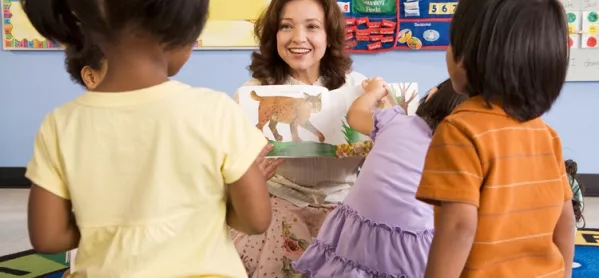Boosting young children’s vocabulary has been highlighted as a major priority in the government’s social mobility action plan, published today.
The gap between disadvantaged children and their classmates arises early and can be “stubbornly hard to close”, according to the Unlocking Talent, Fulfilling Potential report.
Vocabulary is a key predictor of whether a child from a disadvantaged background will succeed at school, it adds.
The report states: “We must continue to support all aspects of children’s rounded early development, including social and emotional and numeracy skills, which are all vital to later success.
“But - because of its broader impact - we also now want to place a particular emphasis on this pronounced ‘word gap’ often faced by disadvantaged children, focusing on improving early language and literacy as the key enabling skills when children enter school.”
It points out that by the age of 3, disadvantaged children are - on average - already almost a full year and a half behind their more affluent peers in their early language development.
And to tackle this “word gap”, the government is proposing:
- A £50 million investment to set up a new national network of “English hubs” - with a particular focus on Reception year. This is an idea that was first trailed in Ms Greening’s speech to the Conservative Party conference in October.
- £20 million is also being put into training early years practitioners in supporting early language and numeracy.
- £50 million will be provided to support high-quality school-based nursery provision - both to ensure that more new schools include nursery provision and good existing schools introduce or expand nursery provision. The Conservative manifesto included a pledge to introduce a presumption that all new primary schools would include a nursery.
Today’s report also says that the early learning goals, which are assessed at the end of Reception year, will be strengthened to “increase the depth and breadth of vocabulary”, something which emerged from the consultation on primary assessment carried out earlier this year.
Strong Reception year practice
And, following Ofsted’s Bold Beginnings report, which said that Reception year was a “false start” for too many children, the government has said it will set up expert groups - drawn from the profession - to develop guidance on strong Reception year practice.
Other action to tackle the “word gap” includes a £5 million trial of programmes to boost learning in the home for pre-school children, and the development of an early language assessment tool to enable those working with pre-school children to spot delays early.
And “dashboards” will be developed, showing the take-up of early education in each authority area, with £8.5 million for a “system leadership” programme to encourage high-performing local authorities to work with others.
The social mobility action plan sets out an overarching ambition of “tackling the injustices that hold people back at each life stage”.
Closing the word gap in the early years is one of its four key ambitions for doing this - along with closing the attainment gap in schools, offering high-quality post-16 education choices and providing opportunities for adults to retrain and upskill.
“We are under no illusion that these issues can be tackled quickly. Nor, importantly, can they be tackled by education alone,” the report states. “These actions will need to be built on consistently over time to have a transformative impact on what is, by definition, a generational challenge.”
Want to keep up with the latest education news and opinion? Follow Tes on Twitter and Instagram, and like Tes on Facebook




